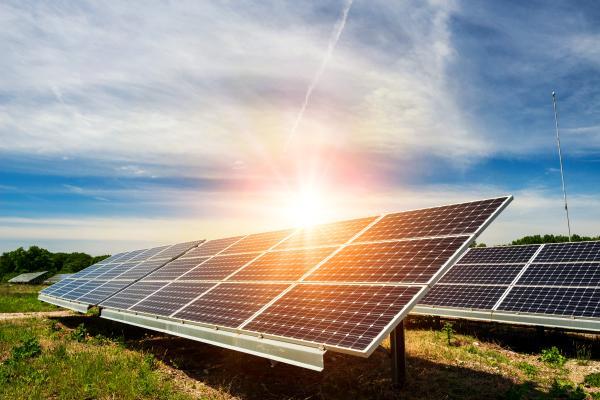
- A €25 million loan for a 55 MW photovoltaic plant integrated with an innovative energy storage system.
- A key project in developing a clean energy solution for isolated and non-interconnected areas.
- An EIB investment supported by the InnovFin Energy Demonstration Projects (EDP) facility under Horizon 2020 and backed by NER300 resources, which will be the first hybrid storage project financed under that facility.
The European Investment Bank (EIB), with the support of the European Commission, has granted a €25 million loan to CEOG S.A.S, a special purpose vehicle dedicated to the project owned by Meridiam EI (60%), Société Anonyme de Raffinerie des Antilles (“SARA”) (30%) and Hydrogène de France (“HDF Energy”) (10%). Located in the municipality of Mana, around 13 km from Saint Laurent du Maroni in the north-east of French Guiana, it concerns the construction and operation of a photovoltaic plant with an installed capacity of 54.5 MW. The plant will be integrated with a hydrogen storage facility with capacity of up to 88 MWh in gaseous form, a 38 MWh battery energy storage system (“BESS”) and a fuel cell with capacity of 3 MW. This innovative power plant will produce baseload, dispatchable and non-polluting electricity for the equivalent of 10 000 homes in western French Guiana all year round, day and night.
The plant, planned to start operating in 2024 for a period of 25 years, will be able to provide 10 MW of renewable energy (3 MW during the night) and the production profile will depend on the needs of the system operator and the state of charge of the energy system. The energy storage system consists principally of a hydrogen-based energy storage system using lithium-ion batteries.
The project will be one of the first to employ a hydrogen-based system for power-to-power application of such size. This facility is key in developing a clean, firm dispatchable energy solution for isolated and non-interconnected areas. The plant will be connected to French Guiana’s grid through an underground cable connecting at the Saint Laurent du Maroni substation. The project will also be key for developing other applications for renewable hydrogen hubs.
The main shareholder, Meridiam, leads the project development and will manage it over the long term. The company that developed the hybrid battery-hydrogen energy storage system (Hydrogène de France, HDF) is providing development and engineering services. Such a hybrid system is capable of providing non-variable renewable energy. SARA is a fuel distribution company established in the French Antilles (Guiana, Guadeloupe, Martinique) where it owns a refinery which supplies fuel to the petrol stations in the region.
The EIB’s financing of the project will benefit from InnovFin EDP support under the Horizon 2020 programme backed by NER300 resources.
Mariya Gabriel, European Commissioner for Innovation, Research, Culture, Education and Youth, said: “The European Union stands at the forefront of the fight against climate change, investing in science and strengthening European research and innovation capacity. With the InnovFin Energy Demonstration Projects facility, a successful financial instrument under Horizon 2020, we are contributing to the energy transition and tackling variable renewable energy sources. The hybrid system announced today combines photovoltaics with storage solutions and will provide a stable output to the grid, which is particularly needed in remote regions where the grid is less developed.”
“This project, combining a photovoltaic plant with innovative storage technologies including hydrogen systems, illustrates very well how climate change issues may find efficient answers through innovative solutions of energy production and storage”, stated EIB Vice-President Ambroise Fayolle. “For the European Union and its climate bank, it is very important to support the deployment of very advanced renewable energy technologies that can be adapted to the specific characteristics of each territory.”
Thierry Déau, CEO of Meridiam said: “This project is not only currently the largest power plant project in the world to store intermittent renewable energy using hydrogen, it is highly innovative. It will stimulate local economic activity and contribute to positive environment and social impacts.”
Background information
In 2020, the EIB invested €4.3 billion in France for energy efficiency, renewable energy and climate change mitigation, making the country the largest beneficiary of EIB financing in this field. The EIB has already invested in three funds managed by Meridiam and finances a number of projects sponsored by the Meridiam Transition Fund (Allego and Voltalis, to name but two).
InnovFin Energy Demonstration Projects (InnovFin EDP) is a venture-financing facility designed to support the demonstration of innovative clean energy projects in the fields of renewable energy, energy storage, smart energy systems and carbon capture, use and storage. The aim is to bridge the gap from demonstration to commercialisation and thus contribute to the deployment of the next generation of innovative low-carbon energy technologies. Given the high risk involved, these EIB loans are guaranteed by the European Commission in the event of default. InnovFin EDP is financed by Horizon 2020 and NER300 funds.
Meridiam was founded in 2005 by Thierry Déau, with the belief that the alignment of interests between the public and private sectors can provide critical solutions to the collective needs of communities. Meridiam is an independent investment benefit corporation under French law and an asset manager. The firm specialises in the development, financing, and long-term management of sustainable public infrastructure in three core sectors: mobility, energy transition and environment, and social infrastructure. With offices in Addis Ababa, Amman, Dakar, Istanbul, New York, Luxembourg, Paris, Toronto and Vienna, Meridiam currently manages US$17.8 billion and more than 100 assets to date. Meridiam is certified ISO 9001:2015, Advanced Sustainability Rating by Vigeo Eiris (Moody’s), and applies a proprietary methodology in relation to environmental, social and governance (ESG) impact based on the United Nations’ Sustainable Development Goals (SDGs).